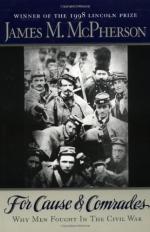
|
| Name: _________________________ | Period: ___________________ |
This test consists of 5 multiple choice questions, 5 short answer questions, and 10 short essay questions.
Multiple Choice Questions
1. In the discussion of the hardships for soldiers' wives, what percentage of officers does McPherson say were married in his sample?
(a) 72%.
(b) 14%.
(c) 28%.
(d) 51%.
2. As McPherson discusses the statistics for married men versus unmarried men, what percentage of married soldiers does he say were killed in action?
(a) 67%.
(b) 13%.
(c) 23%.
(d) 48%.
3. While discussing differing interpretations of liberty from North and South, McPherson quotes a Texas cavalryman with Forrest who wrote that the issue was all BUT WHICH of these?
(a) Subjugation.
(b) Confiscation.
(c) Slavery.
(d) Elimination.
4. Between May 5 and June 22, 1864, the Army of the Potomac and the Army of Northern Virginia experienced casualties amounting to what percent of their original strength?
(a) 38%.
(b) 60%.
(c) 49%.
(d) 95%.
5. After the discussion of the conflict between love of family and love of country, McPherson quotes an Alabama soldier as saying he worried for his wife if they failed. What was his wife's name?
(a) Mary.
(b) Cellie.
(c) Annabelle.
(d) Margaret.
Short Answer Questions
1. When discussing the assertions of patriotism as a motivation for fighting, what percentage of the 429 Confederate letters and diaries used as sources affirmed this motivation?
2. From which state was the private who wrote in January 1862, after speaking to a slave whose husband had been beaten, that he was convinced of the "cruelty and inhumanity of the system"?
3. Which most notorious massacre of black prisoners happened on April 12, 1864?
4. At the end of "Chapter 8: The Cause of Liberty," by what year had Northern soldiers broadened their concept of liberty to include black people?
5. An Illinois cavalryman, who wrote a letter home on January 12, 1865, used the word "duty" how many times in a single sentence?
Short Essay Questions
1. In Lincoln's discussions of democracy, what fear did he express if the South should be allowed to secede?
2. What was meant when some soldiers wrote home about being stuck in a "rich man's war," toward the end of "Chapter 7: On the Altar of My Country"?
3. Describe the information and political education level maintained by soldiers in "Chapter 7: On the Altar of My Country."
4. Under what conditions were black soldiers allowed to join the Confederate army during the final year of the Civil War?
5. McPherson denies, in the discussion of liberty, that Southern soldiers were obsessed with slavery. What statistical evidence does he supply to support this?
6. Why are there no letters from black Union soldiers, according to "Chapter 9: Slavery Must be Cleaned Out"?
7. Explain the phenomenon of "dry rot," as discussed in "Chapter 10: We Know That We Are Supported at Home."
8. What challenges did soldiers face in the last year of the Civil War that exacerbated their combat exhaustion?
9. In "Chapter 10: We Know That We are Supported at Home," why did some officers worry that married men made bad soldiers?
10. Explain the massacres of black soldiers, as discussed in "Chapter 11: Vengeance Will be Our Motto."
|
This section contains 1,181 words (approx. 4 pages at 300 words per page) |

|




